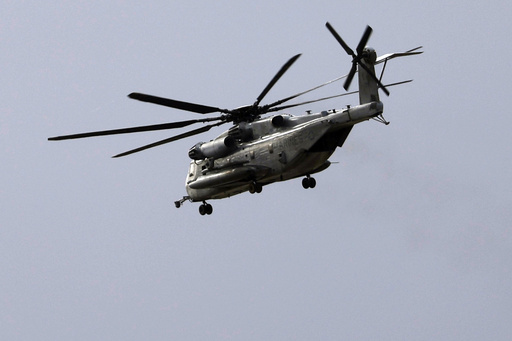Rescue of Marine helicopter challenged by snowy California mountains

A Marine CH-53E Super Stallion helicopter flies during training at Marine Corps Air Station Miramar in San Diego, Tuesday, Feb. 6, 2024. A Marine Corps helicopter, like the one pictured, that had been missing with five troops aboard as an historic storm continued drenching California was found Wednesday morning, Feb. 7, 2024, in a mountainous area outside San Diego.(K.C. Alfred/The San Diego Union-Tribune via AP)
SAN DIEGO — Rescuers were battling heavy snow Wednesday to reach a Marine Corps helicopter carrying five troops that went down in the mountains outside San Diego.
The CH-53E Super Stallion helicopter — the largest helicopter in the military, designed to fly in harsh conditions — had gone missing as an historic storm dumped heavy snow and record rain over California.
Civilian authorities searching on ground and by air located the aircraft just after 9 a.m. Wednesday near the mountain community of Pine Valley, about a 45-mile (72-kilometer) drive from San Diego, but snowy conditions were making it challenging to gain access on the ground, officials said. The fate of those aboard wasn’t immediately known.
The Marines were flying from Creech Air Force Base, northwest of Las Vegas, where they had been doing unit-level training and were returning home to Marine Corps Air Station Miramar in San Diego, defense officials said.
READ: Storm, fueled by atmospheric river, brings record rain to Los Angeles
Article continues after this advertisementIt was not immediately known what time the helicopter left Creech nor what time they were due to arrive. Waves of heavy downpours hit the area throughout the night and heavy snow fell in the mountains in Southern California.
Article continues after this advertisementThe last known contact with the helicopter was at about 11:30 p.m. Tuesday, Cal Fire’s spokesperson Mike Cornette told CBS 8 news. That location was based on a “ping” reported to a Cal Fire dispatch center. The agency sent several engines and an ambulance to the area overnight.
Cal Fire officials said the military helicopter was reported missing in an area north of Interstate 8 and Kitchen Creek Road, located southeast of Pine Valley, which is at about 3,700 feet (1,127 meters) in elevation in the Cuyamaca Mountains.
Pine Valley was experiencing light rain and wind between about 11 p.m. and 1 a.m., said Casey Oswant, a meteorologist with the National Weather Service, San Diego. Weather data from the region is relatively sparse, she said.
Snow likely began around 6 a.m., with 6 to 8 inches (15 to 20 centimeters) accumulating within a matter of hours, according to another nearby weather station.
The area includes San Diego County’s second highest mountain, Cuyamaca Peak, at 6,512 feet (1,985 meters), and is also near the Cleveland National Forest, which covers 720 square miles (1,860 square kilometers) with much of it steep, rocky and with limited trails.
The five U.S. Marines were assigned to Marine Heavy Helicopter Squadron 361, Marine Aircraft Group 16, 3rd Marine Aircraft Wing, the military said in a statement.
READ: Southern California faces final cloudburst, renewing mudslide threat
Additional resources were brought in because of the heavy snowfall Wednesday in the sparsely populated mountains, the California Department of Forestry and Fire Protection, known as Cal Fire, said in a statement on X, formerly known as Twitter.
Cal Fire said it was coordinating with the military, the U.S. Forest Service, U.S. Border Patrol, San Diego sheriff’s department and the state Civil Air Patrol.
The National Weather Service in San Diego called for 6 to 10 inches (15 to 25 centimeters) of snow in the mountains above 5,000 feet (1,524 meters) and gusty winds late Wednesday. On Tuesday afternoon a tornado warning was issued but quickly canceled with the weather service saying the storm was not capable of forming a twister.
President Joe Biden was briefed on the missing Marines, said White House press secretary Karine Jean-Pierre, who answered questions as the president flew to New York City for campaign fundraisers.
“We’re watching this closely and again our thoughts are for the best,” National Security Council spokesperson John Kirby said.
In 2018, four Marines died when their CH-53E Super Stallion crashed in the same general area during a training mission. The Marine Corps ruled out pilot error for the accident near El Centro. The victims’ families later sued two companies they alleged provided a defective part that they blamed for the crash.
About 99 feet (30 meters) long, the CH-53E Super Stallion can move troops and equipment over rugged terrain in bad weather, including at night, according to the Marine Corps website. It is also nicknamed the “hurricane maker” because of the amount of downwash generated from its three engines.
Two CH-53E helicopters were used in the civil war-torn capital of Mogadishu, Somalia, in January 1990 to rescue American and foreign allies from the U.S. embassy.
A Super Stallion also went down in a sandstorm in Iraq in 2005, killing 31 people on board. The accident, blamed on pilot error, was the single deadliest loss of U.S. troops during the war.